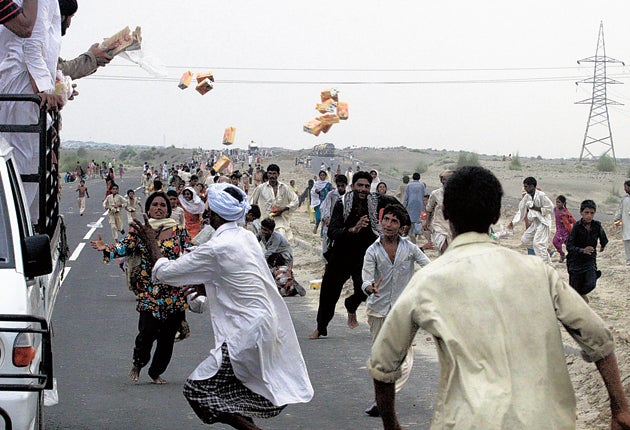Speed up aid to Pakistan, shocked Ban Ki-moon tells donors

Foreign donors were urged by the UN chief to quicken their aid to flood-hit Pakistan as experts warned there was an urgent threat of cholera and other water-borne diseases spreading further.
The UN Secretary-General, Ban Ki-moon, who visited some of the stricken areas yesterday, said he had never seen a disaster as bad as the flooding in Pakistan. It was essential that more funding was dispatched quickly he warned. Only a quarter of the $459m (£294m) of aid estimated to be needed for initial relief in the country has so far arrived.
"I am here to share my sympathy and the solidarity of the United Nations together with the people and government of Pakistan at this time of trial," said Mr Ban, before heading off for meetings with President Asif Ali Zardari and Pakistan's Prime Minister, Yousuf Gilani. "I am here also to urge the world community to speed up [its] assistance to Pakistan."
The floods have killed 1,600 people and affected 20 million others. Around 2 million are homeless and up to 6 million are in need of food, water and medicine. Over the weekend, the UN reported the first case of cholera and fears have been expressed such outbreaks could spread.
The country's main crops of wheat, cotton and sugar have all suffered massive damage in a nation where agriculture is a mainstay of the economy. The International Monetary Fund has warned of dire economic consequences. Meanwhile, there are sporadic reports of fights among survivors as they battle for food. Around 500,000 tonnes of wheat have been destroyed.
"We are here like beggars," said Mukhtar Ali, a 45-year-old accountant living on the side of a road in Sukkur, in Sindh province, told the Associated Press news agency. "The last food we received was a small packet of rice yesterday and 15 of us shared that."
Given the scale of the disaster, aid groups say donor nations have lacked leadership and been slow to respond adequately, compared to other crises. They have expressed hope that the secretary-general's visit will lead to a dramatic shift of pace. Various reports have suggested doubts about the transparency of the Pakistani authorities has held back some donations.
"The speed with which the situation is deteriorating is frightening. Huge swathes of the country remain under water, and we are extremely concerned about the risk of diseases such as malaria, cholera and dengue fever," said Neva Khan, country director of Oxfam. "Communities desperately need clean water, latrines and hygiene supplies, but the resources currently available cover only a fraction of what is required."
While there is a massive need to help those affected, for some areas the worst is yet to come. Surging waters still could still threaten communities in southern Sindh and Baluchistan.
President Zardari has been widely criticised for failing to cut short an overseas visit while the floods were at their peak and, in the weeks ahead, he will likely face further condemnation, even if politics has for now taken something of a back seat. Over the weekend, the opposition leader Nawaz Sharif and Mr Gilani agreed to put politics aside and concentrate on tackling the crisis.
At the same time, for all the criticism of the authorities, some commentators have pointed out that any country would struggle to deal with a disaster of this scale.
"The civilian authorities are slowly getting their act together. They will continue to be slammed for not doing enough, this time by their own people, but the magnitude of the problem is such that even the most efficient and committed government's relief measures would leave a lot to be desired," said Ayesha Jalal, a Pakistani historian, based at Tufts University in the US.
Join our commenting forum
Join thought-provoking conversations, follow other Independent readers and see their replies
0Comments